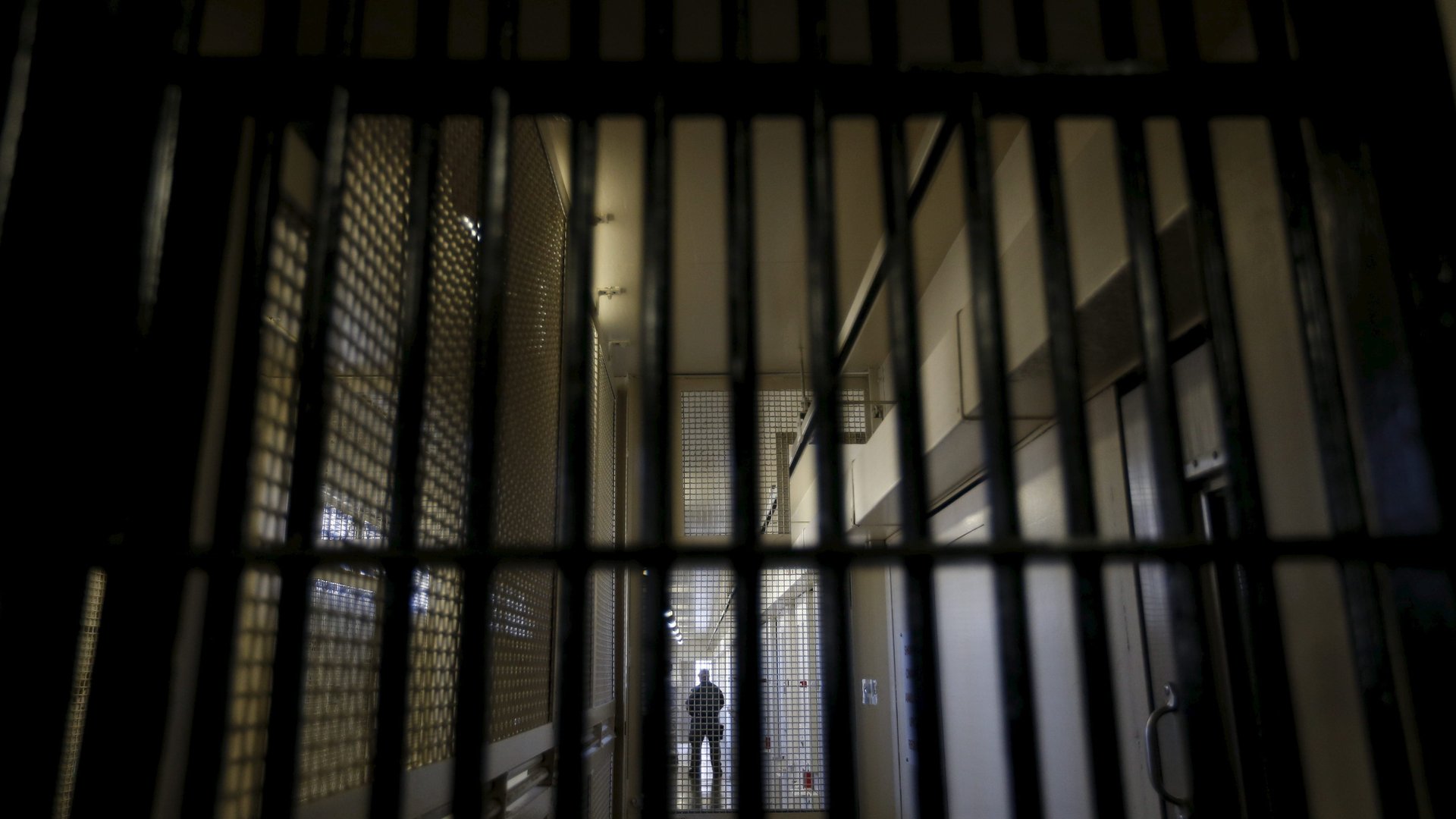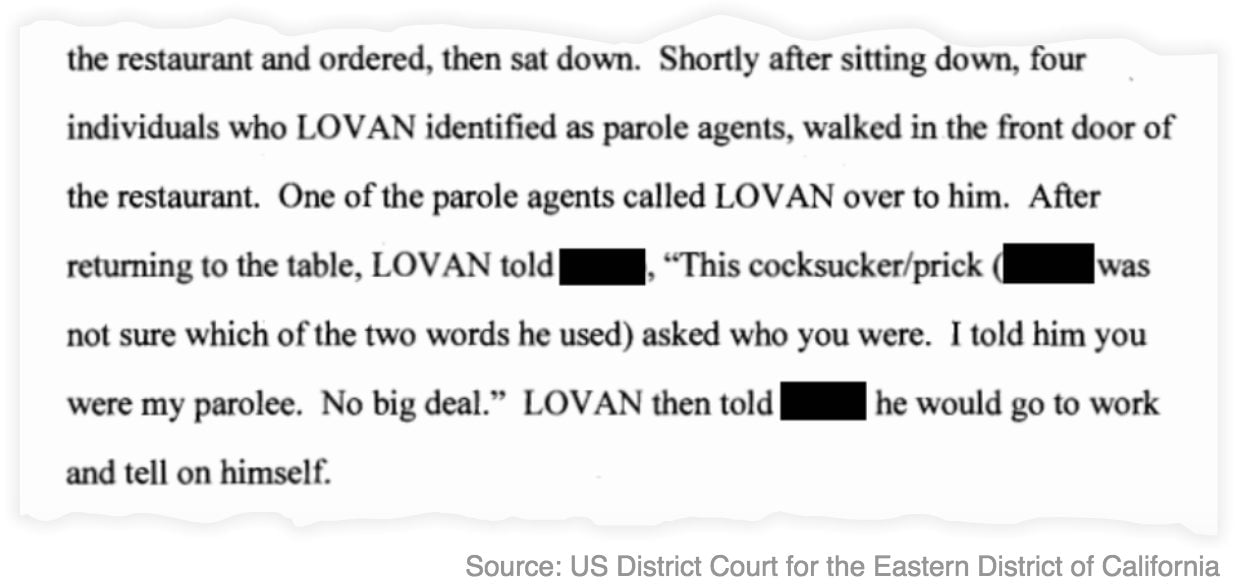US parole system fraught with allegations of sexual abuse
There are few power dynamics more lopsided than the one between a parole officer and a parolee.


There are few power dynamics more lopsided than the one between a parole officer and a parolee.
Wielding near-total control over the former prisoners they supervise, a parole officer can put someone back behind bars without so much as a court hearing in some instances. Nearly 80% of all US inmates end up back in jail within five years of being released. For a parolee, it can be for something as serious as reoffending outright. But tens of thousands of parolees have also lost their freedom over minor infractions.
Now, according to the details of an FBI search warrant application unsealed in federal court, California parole officer Andre Lovan allegedly led a woman under his supervision to believe she would be sent back to jail unless she provided him with sex on demand. The document offers a glimpse at just how uneven the parole officer-parolee relationship can be, and serves as an example of a worst-case scenario for the state’s parole division.
Over the course of nearly a year, beginning in early 2017, Lovan coerced the former inmate into sexual intercourse at her home, in parking lots, and in hotel rooms, the filing says. For privacy reasons, Quartz is identifying the victim only by her first name, Mary.
“It was a horrible, horrible experience and the aftermath is even worse,” Mary told Quartz. “At the time, I just wanted to kind of lick my wounds and let it go away. But it doesn’t go away.”
Experts say it is likely that such abuse by probation and parole officers goes vastly underreported, as most parolees are worried a complaint could land them back in jail. Because of this and other limitations, it is almost impossible to get a sense of the overall size and scope of the issue. At least a half dozen university professors who study the US correctional system said they were unaware of any study that has tracked incidents of abuse by parole or probation officers. However, published reports offer anecdotal evidence that sex abuse by both types of officers is altogether far too common. A 2014 lawsuit filed by the American Civil Liberties Union accused a New Mexico parole officer of almost the identical behavior with which Lovan is suspected.
In Lovan’s case, it was a brazen decision to take his victim out in public for lunch that ultimately led to his undoing.
Imbalance of power
Shortly after Mary was put on Lovan’s roster, he called her from his department-issued phone. Lovan told Mary, who spent 29 years in prison for her role in a 1986 murder and is now in her 60s, that he “liked her” and was “going to kiss her” when he saw her next, according to the FBI search warrant.
During Lovan’s first official visit to Mary’s home, he asked to see the bedroom. There, Lovan kissed Mary and pulled her toward the bed. Mary waved him off, saying her aunt was in the next room.
A few days later, he called again and asked that she meet him in the parking lot of a Sacramento shopping center. He waited for her in his official vehicle, with official paperwork strewn across the back seat. According to the FBI, Lovan put Mary’s hand “on his lap over his pants where [she] could feel Lovan’s erect penis.”
“What can you do with that?” Lovan allegedly asked.
She said she wasn’t going to do anything in Lovan’s car. Lovan instructed Mary to get a hotel room for their next encounter. She would have to make the reservation and pay the bill because Lovan, who earned more than $170,000 a year including benefits, said he couldn’t have his “name on anything during work hours.”
Lovan later called Mary with his schedule, and she reserved—and paid for—a room at the Governors Inn, a seedy West Sacramento motel sandwiched between a McDonald’s and a police station. Lovan arrived and stripped down to his boxers. He told Mary that he didn’t want to have intercourse, and asked for oral sex. Mary complied.
Mary, who identifies as gay, told the FBI she has not had any interest in men in “a long time.” She only had sex with Lovan, “because she does whatever her parole agent tells her to do.”

“When asked, [Mary] said she was very afraid of having her parole violated or being re-arrested and sent back to prison,” the FBI filing says. “[Mary] said she did not know what Lovan or his partners were capable of, but that she was not going to take the chance.”
A civil suit later filed by Mary says Lovan “made it clear to [Mary] that if she resisted or denied him in his sexual advances he would violate her parole and return her to custody.” It claims Lovan kept his badge visible during their sexual encounters, and kept his gun on the motel dresser.
“This was extremely frightening and intimidating to [Mary]—who feared for her safety,” the filing says.
Chrysanthi Leon, an associate professor of sociology and criminal Justice at the University of Delaware, told Quartz that any incarcerated person, especially if they were in prison for many years, is going to do whatever they must to avoid going back to jail. “But I think especially a woman who has a male parole officer, that’s a specific kind of threat. People who have this amount of power over others without checks and balances, I think that they abuse that,” she said.
Calls to a phone number listed for Lovan went unanswered, and Lovan did not respond to emailed interview requests. A spokesman for the California Department of Corrections said in an email the agency doesn’t comment on pending investigations.
Fate intervenes
After one of their last meetings at the Governors Inn, Lovan told Mary he wanted to take her out to lunch. They settled on a taqueria near the motel. Coincidentally, so did a group of Lovan’s colleagues. One of them reported to their supervisor that Lovan was spotted having lunch with a parolee. Lovan, however, was only warned not to make it “a habit.”

He continued to call on Mary for sex. He submitted official reports that he was meeting in person with her twice a month—a potential red flag in itself, as Mary was only required to have in-person contact with her parole officer every eight weeks.
About halfway through 2017, Mary was transferred to a different parole officer. Lovan told her at the time that he was “very well connected” and if anyone ever found out about what had happened, “things would go very badly for her.” Afraid for her freedom and safety, Mary didn’t say a word.
It was during a mandatory counseling session in May 2019 that she finally revealed her secret.
“I was going to just keep quiet and hope that I could carry on when I was off parole,” Mary told Quartz. “But through a great counselor and me having a bad day, it came out. And she had no recourse but to report it from there, and it became open. And I’m glad that it’s open because I wouldn’t want it to happen to anybody else.”
As the FBI filing confirms, Mary’s counselor initially agreed to keep their conversation confidential but later said she was obligated to bring the information to parole officials. Within a week, Mary had drafted a statement laying out her accusations against Lovan.
A final hurdle
Women who report such misconduct can often run into institutional roadblocks. In 2015, for instance, a South Florida woman went so far as to videotape her rape by a parole officer so authorities would take her claims seriously.
According to Mary’s civil suit, when she arrived at the parole office to file her complaint against Lovan, his supervisor refused to take her statement. The next month, Mary was contacted by federal and state investigators, presumably having been tipped off by Mary’s counselor. Lovan, who had been on the job for more than 25 years, retired abruptly after the investigation began.
The investigators told Mary that she was not the only woman who had reported Lavon for sexual abuse. Mary allowed investigators to search her phone for evidence, but had deleted much of her communications with Lovan for fear that “she would be sent back to prison” if anyone saw them.
Lovan, who is now collecting a pension north of $80,000 a year, has not yet been charged. In the meantime, Mary waits. If the FBI investigation results in charges and Lovan is ultimately convicted, he will—ironically—never be eligible for parole. There is no early release in the federal system.